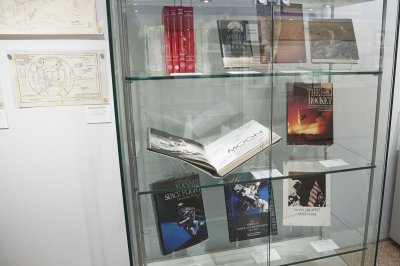Topic: Barbara McClintock
Barbara McClintock (June 16 1902 – September 2 1992), the 1983 Nobel Laureate in Physiology or Medicine, was an American scientist and one of the world's most distinguished cytogeneticists. McClintock received her PhD in botany from Cornell University in 1927, where she was a leader in the development of maize cytogenetics. The field remained the focus of her research for the rest of her career. From the late 1920s, McClintock studied chromosomes and how they change during reproduction in maize. Her work was groundbreaking: she developed the technique for visualizing maize chromosomes and used microscopic analysis to demonstrate many fundamental genetic ideas, including genetic recombination by crossing-over during meiosis—a mechanism by which chromosomes exchange information. She produced the first genetic map for maize, linking regions of the chromosome with physical traits, and demonstrated the role of the telomere and centromere, regions of the chromosome that are important in the conservation of genetic information. She was recognized amongst the best in the field, awarded prestigious fellowships, and elected a member of the National Academy of Sciences in 1944.
During the 1940s and 1950s, McClintock discovered transposition and used it to show how genes are responsible for turning physical characteristics on or off. She developed theories to explain the repression or expression of genetic information from one generation of maize plants to the next. Encountering skepticism of her research and its implications, she stopped publishing her data in 1953. Later, she made an extensive study of the cytogenetics and ethnobotany of maize races from South America. McClintock's research became well understood in the 1960s and 1970s, as researchers demonstrated the mechanisms of genetic change and genetic regulation that she had demonstrated in her maize research in the 1940s and 1950s. Awards and recognition for her contributions to the field followed, including the Nobel Prize for Physiology or Medicine, awarded to her in 1983 for the discovery of genetic transposition; she is the only woman to receive an unshared Nobel Prize in that category.
Barbara McClintock was born in Hartford, Connecticut, the third of four children of physician Thomas Henry McClintock and Sara Handy McClintock. She was independent from a very young age, a trait McClintock described as her "capacity to be alone". From about the age of three until the time she started school, McClintock lived with an aunt and uncle in Massachusetts in order to reduce the financial burden on her parents while her father established his medical practice. The McClintocks moved to semi-rural Brooklyn, New York in 1908. She was described as a solitary and independent child, and a tomboy. She was close to her father, but had a difficult relationship with her mother.
It uses material from the Wikipedia article "Barbara McClintock."






